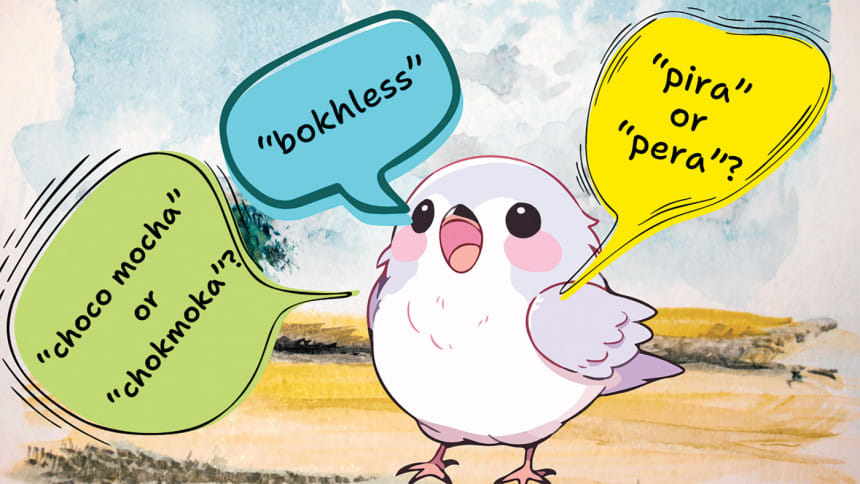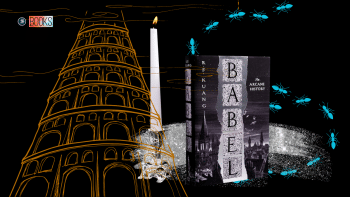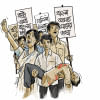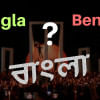Bangalis and the “cutification” of English

I hate winters, coffee, and having to remember the rules of English grammar. I suppose I should have used the past tense for the first two of those things because the last few winters have been growing a sense of appreciation in me for the feeling of cold winds seeping through layers of coarse khadi fabric, the sensation of icy dews pricking the bare face, and the warmth a steaming gulp of coffee trails down one's insides. Sitting in the passenger seat of a friend's car, watching a barrage of vehicles zooming in and out of view from the windshield threatening to blur our vision with the winter night's fog, that's the feeling I craved—of coffee and its scalding greeting on my tongue. But we had already left Banani's luscious café landscape by then and were about to enter Mirpur's meagre offering. I told him I wanted coffee and the swift brainstorming session led to an option we both despised: Crimson Cup.
I don't necessarily have anything against the crimson colour nor do I have particular beef with cups. Rather, I think they're quite cool as receptacles willing to serve any texture or season of food. But there's something about the aftertaste, as well as just the regular taste, of Crimson Cup coffees that makes my wallet weep at its regretful loss of a 500 taka note.
With a sigh of resignation, I told him I would just have one of those Nescafé sachets lying around in the kitchen drawer at home (forgive me for the blood money consumption, I hadn't done my BDS movement research yet). The friend in question works at the very organisation that produces those Nescafé sachets. He happily chimed in about the allegedly exciting new flavours being concocted in the Nestlé machine and I informed him that I enjoyed the hazelnut flavoured concoction in spite of it being a tad too sweet. He told me more about the factory, his role in it and about its people and I told him about how I enjoyed mispronouncing the Choco Mocha as "chokmoka."
I suppose this is where my recollection of this otherwise unremarkable memory was meant to lead us all along: to my friend being reminded of a factory worker at Nestlé by my intentional mispronunciation. I don't properly remember what his role there is or his name and I have obviously never seen him, but the reason why this man is imprinted onto my memory is because of his alleged difficulty in pronouncing the word "cappuccino." I picture this man as a scruffy, middle-aged Bangali in overalls—it's the stereotypical image of a working-class man with a rural drawl to his speech that hints at his being new to the city. Nothing extraordinary about that. But what strikes me about him is how he mispronounces it: he apparently calls it "cup e picchi." This instantly gave me a mental image of a cherubic face made of coffee foam peeking out at me from my cup and the following exclamation just bubbled out of me: "That is so freaking cute!" I squealed.
Hence, we discussed more such instances of "cutification"—as my friend would call it—and I recalled to him how on a single visit to the Chadni Chowk gully at the Gawsia/New Market area, I had witnessed, store by store, the gradual devolvement of the name for Mysore cotton to Maisha cotton. We were so engrossed in this conversation, so intrigued by this epiphanic witness of real-time evolution of language and pidgin-like instances, that when we reached the spotlit gates to my home, we passed it and had to snail into a jam-filled u-turn a few hundred metres ahead.
I bade him goodnight and a thanks for dropping me home, and on the walk to the elevator, thought about a distant memory of a teenage me sniggering at the waiter of a Shawarma House branch:
"We have kafasino and lathi", he had said in his regional Bangla dialect.
Throughout that night, I had laid on my back, with that old memory perching like a bird of prey on my sternum. I looked this memory into its hollow eyes.
I am nothing if not a lump of ironies. My prefaced hatred for things like winter and English grammar are probably the most integral elements to my identity as a high school English teacher born in the deep winter of a "shouto probaho" mid-January.
I allowed the bird to poke its beaks into my guilt-infested snobbery.
I turned 28 this January. Although each number I have turned since 25 has felt like a state of limbo prior to my 30s, 28 feels like a number of reckoning. It feels like those few inches away from coming full circle. From this vantage, I can see the podium of privilege I stand on, as well as its lack thereof that makes this podium so precarious. I am speaking of all those memories, of times when I'd corrected my mother's pronunciation of "general" in the typically Bangali style, phonetically sounding more like "genarel;" of when hearing someone refer to a belt buckle as the colloquial "bokhless" felt grating to my ears and of cringing internally at my tailor pronouncing satin as "shartin" or tassels as "tarshells."
The bird was going to eat me and there would be nothing left of me to bury.
In the teachers' room, I hear the Bangla teachers discuss the new proclamations of Bangla Academy for the rules of the Bangla language. Language is ever-changing. My students tell me: even Shakespeare would not understand the elevated diction I ask of them for formal writing genres. And I agree. Obviously. Language is ever-changing. Another friend tells me his mother's theory: that the colloquial "pera" in Bangla is a bastardisation of the Sanskrit and shadhu Bangla, "pira." Language is ever-changing.
I wondered about the necessity of being a so-called "grammar nazi" in online forums as I stared at the bird. The curve of its beaks did not look as sharp anymore. I dared to wonder if this carnivorous beast on my chest was cute in any way. Or perhaps, could I cutify it myself?
It's February 16 and Ammu is telling me about her friend who wants to get a cat. We talk about how some of our relatives would be the worst cat parents and how much better her friend would be at it.
I say, "Aunty shundor take care korte parbe."
What I say strikes my own ears. I smile, and 28 finally brings me reconciliation from the irony of uttering such grammatical blasphemy I would once have scoffed at.
I look at the bird again. Its weight on my chest feels lighter. It is now a sparrow.
Tashfia Ahmed is an educator, poet and contributor for Star Books and Literature. She teaches English at Scholastica school.

 For all latest news, follow The Daily Star's Google News channel.
For all latest news, follow The Daily Star's Google News channel. 











Comments